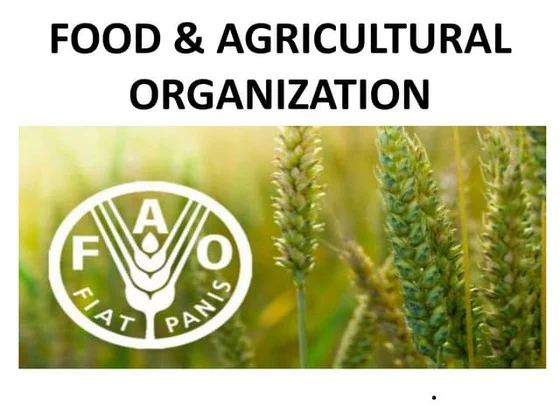Introduction:
Climate change has emerged as a serious global challenge, disproportionately affecting the poor and rural communities. A recent report by the Food and Agriculture Organization (FAO) of the United Nations sheds light on how the climate crisis is impacting the livelihoods of impoverished families. This report not only highlights the adverse effects of climate change but also demonstrates how social inequalities are exacerbating this crisis. Understanding the implications for agriculture and rural poor in India makes this report highly significant.
|
Food and Agriculture Organization (FAO) United Nations- The Food and Agriculture Organization (FAO) is a specialized agency of the United Nations aimed at combating global hunger and improving food security and nutrition. Established on October 16, 1945, its headquarters is located in Rome, Italy. FAO has 195 members, including 194 countries and the European Union. Key Objectives of FAO The main objectives of FAO are as follows:
|
Key Points from FAO's Current Report:
The latest report from the FAO is titled “The Unjust Climate: Measuring the Impacts of Climate Change on Rural Poor, Women, and Youth”. It explains the direct effects of climate change on India's rural poor. Specifically, during droughts or similar crises, poor families are compelled to invest more time and resources in maintaining their agricultural productivity as non-agricultural employment opportunities become limited. This report was presented by FAO’s senior economist, Nicholas Sitko, on October 16, 2024, in New Delhi. The key points are:
- Economic Losses from the Climate Crisis: The report reveals that globally, poor families lose 5% of their income annually due to heat stress and 4.4% due to flooding.
- Impact on Rural Poor in India: According to the report, the impact of the climate crisis on rural poor families in India varies. During droughts, these families invest more resources in agriculture due to a lack of non-agricultural employment opportunities.
- Structural Inequalities: The report states that the vulnerability of poor families to the climate crisis is rooted in structural inequalities. It recommends policy measures like expanding social protection.
- Suggestions for Livelihood Support: The report suggests that the government should expand social protection programs in advance and create more non-agricultural employment opportunities.
- Gender Inequality and Employment Barriers: The report calls for adopting a 'gender-transformative' approach to address gender inequalities in non-agricultural employment.
Response from NITI Aayog-
In response to the report’s findings, NITI Aayog member Ramesh Chand stated that India is doing its best to tackle climate change. He highlighted the following initiatives:
- Efforts to Address Climate Change: NITI Aayog mentioned India's active initiatives to combat climate change, such as the National Innovations on Climate Resilient Agriculture (NICRA) project, which helps farmers adapt to severe climatic conditions.
- Social Security Schemes: NITI Aayog cited examples of India's employment guarantee scheme and food distribution during the pandemic as social protection initiatives.
- Women's Participation in the Workforce: Citing recent labor force survey data, NITI Aayog noted a significant increase in women's participation in the workforce, indicating progress in addressing gender issues.
- Willingness to Adopt FAO's Recommendations: NITI Aayog expressed a willingness to consider FAO's recommendations while emphasizing existing initiatives.
The Way Forward-
The various steps taken by the government are working towards mitigating the effects of climate change on rural poor, women, and youth. However, further actions can be taken in the following directions:
- Strengthening Social Security: Expanding social security programs and climate-resilient agricultural practices is essential to safeguard the incomes of poor families from climate crisis impacts.
- Addressing Structural Inequalities: Promoting non-agricultural employment opportunities, eliminating gender inequalities, and implementing policy-based measures to combat the climate crisis is necessary.
Conclusion:
The FAO report highlights the severe consequences of climate change for rural poor in countries like India. It also shows that improving social security and employment opportunities can better address this crisis. NITI Aayog member Ramesh Chand suggested that the various initiatives implemented by India should be included in FAO's report; however, if any good policy advice is provided, the government will take it seriously.
|
Key Takeaways for UPSC Aspirants 1. FAO (Food and Agriculture Organization) is a specialized agency of the United Nations aimed at eradicating hunger and malnutrition, promoting sustainable agriculture, and enhancing food security. 2. The latest FAO report states that global poor families face a 5% income loss due to heat stress and a 4.4% loss due to flooding as a result of the climate crisis. 3. The report indicates that rural poor families in India rely more on agriculture during droughts and climate crises due to a decline in non-agricultural employment opportunities. 4. The report highlights that the vulnerability of poor families to climate crises is linked to structural inequalities, necessitating policy-driven social security and employment reforms. 5. India has implemented initiatives like NICRA to address climate change and expand social security measures. NITI Aayog has welcomed FAO's recommendations and is considering reforms. 6. It is crucial to enhance climate-resilient agricultural practices and social security programs while improving non-agricultural employment opportunities to address structural inequalities. |
|
Probable questions for UPSC Mains exam: What is the importance of social security schemes in mitigating the effects of climate change? How can these schemes be made more effective? |








